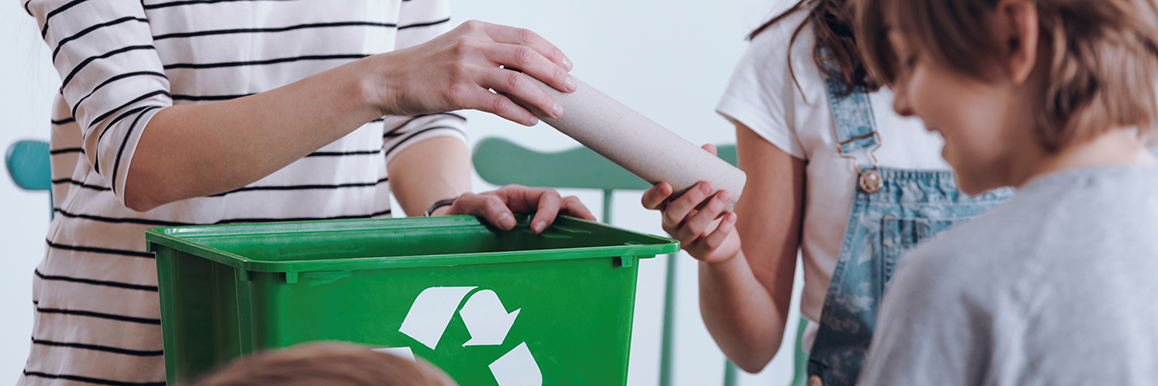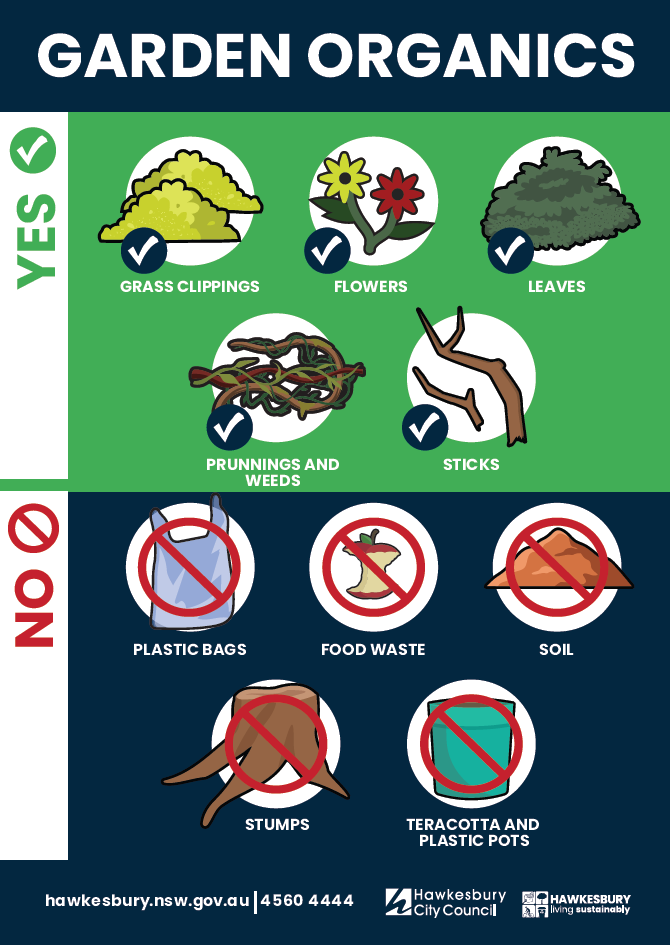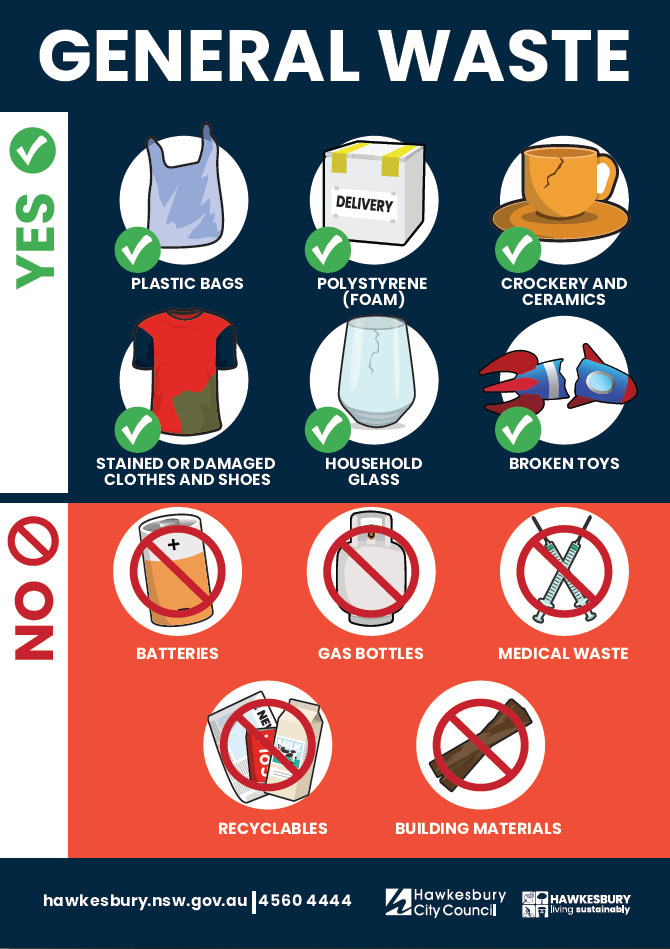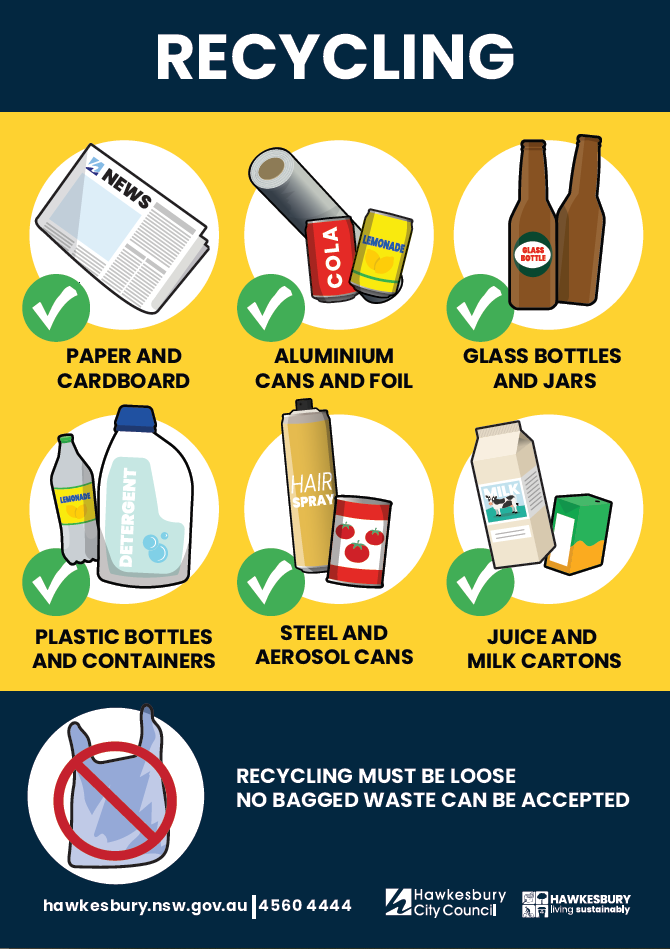
Household Bins
Hawkesbury City Council provides waste collection services to most residences within the Hawkesbury Local Government Area (LGA). The waste collection service consists of the collection of a red-lidded general waste bin, a yellow-lidded recycling bin and a green-lidded garden organics bin (selected urban areas). There are several service options which residents can choose from.
Please see below answers to frequently asked questions regarding household waste collection services.
FAQS
Bin Collection Day
Your red-lid general waste bin is serviced weekly (selected areas are fortnightly), your yellow-lid recycling bin is serviced fortnightly, and your green-lid garden organics bin (in selected urban areas) is served fortnightly, on the alternate fortnight to your yellow-lid recycling bin.
To check your bin collection day and your recycling bin and garden organics collection week, please refer to the Bin Collection Day dashboardThis external link will open in a new window.
Alternatively, you can download the 2024/2025 Recycling Collection Calendars through the below links:
Bin Placement Guidelines
Please place your bins out by the night before your day of collection. Bins should be spaced at least one (1) metre apart from each other and at least half (½) a metre from the road. Ensure bins are clear from trees, cars and other obstructions. Lids should be fully closed and the lid opening should be facing the road.
Bins must not weigh more than 80kg (kilograms), or they will not be collected.

Bin Request / Service Change Form
If you would like to proceed with changing the current size of your general waste bin or requesting a new bin service, please complete and submit the Bin Request Form.
Council aims to make it easier and more convenient for residents to request a bin or service change through online request forms. If you are experiencing any problems with the online request form, or wish to speak to a customer service officer, please email Council’s Customer Experience on council@hawkesbury.nsw.gov.au or call (02) 4560 4444 during normal business hours.
Please note the following:
- You must be the property owner to make any changes to your current bin collection service. If you are the tenant of the property, you must contact the real estate agent or your landlord.
- Charges are involved when requesting to exchange to a smaller / larger general waste bin or a new bin service.
- Any commencement or change to a bin collection service must remain in place for a minimum of 12 months.
Do remote area properties need a General Waste bin?
A general waste bin service is not compulsory for any rate payer who has to ‘bring the bin to top of road’ however, if chosen to have a general waste bin then service charges will apply.
Garden Organics Bin (Green-lidded) Service Eligibility
To check if your household or business is eligible to receive the green-lidded garden organics bin, please refer to the Bin Collection Day dashboard, hereThis external link will open in a new windowThis external link will open in a new windowThis external link will open in a new windowThis external link will open in a new window.
If you have any further enquiries please contact Council’s Customer Service on council@hawkesbury.nsw.gov.au or call on (02) 4560 4444.
How do I book a kerbside clean-up?
Residents who receive a domestic kerbside waste collection service from Council can book one Kerbside Bulk Waste Household Clean-up Service each financial year. You can have excess garden organics collected as part of this service.
For further information about this service, please refer to the Kerbside Clean Up Service page.
How do I dispose of household chemicals?
You can safely dispose of any potentially hazardous household chemicals at an Annual Household Chemical CleanOut event. Please note only household quantities of these items will be accepted.
For more information about what you can take and the date of your next Household Chemical CleanOut, please refer to the Household Chemical CleanOut page.
How can I save money on my waste charges?
If you’re a household or business whose general waste bin is hardly ever full, you can save money by reducing the size of your general waste bin from a 240L to a 140L bin.
If you would like to proceed with changing the current size of your general waste bin or requesting a new bin service, please complete and submit the Bin Request Form.
Please note the following:
- You must be the property owner to make any changes to your current bin collection service. If you are the tenant of the property, you must contact the real estate agent or your landlord.
- Charges are involved when requesting to exchange to a smaller / larger general waste bin or a new bin service.
Any commencement or change to a bin collection service must remain in place for a minimum of 12 months.
Missed Collection Services
If your bin has not been serviced by 3pm on your collection day please contact Council’s Customer Service on council@hawkesbury.nsw.gov.au or call on (02) 4560 4444.
Needles and Sharp disposal
Sharps such as needles and syringes pose a health risk to the community and it is the responsibility of any individuals, health professionals, community organisations and businesses using these items to dispose of them appropriately.
View the NSW Health website here for information on Community sharps management. For further information regarding sharps disposal and other waste and health issues in the Hawkesbury area, contact Councils' Environmental and Regulatory Services branch on (02) 4560 4444.
Individuals
The nearest sharps disposal location's in the Hawkesbury Local Government Area are:
- Woodhill Carpark, 187 Windsor Street Richmond (behind Services NSW)
- Sharps container at Pitt Lane North Richmond
- Hawkesbury Hospital: Cnr Day and Macquarie Streets, Windsor. Community sharps bin (kerbside between the Community Health Centre and the hospital)
- Hawkesbury Community health Centre: Cnr Day and Macquarie Streets, Windsor. Community sharps bin (approx. 30 metres left of the front entrance on the kerbside)
For further information please visit the NSW EPA’s websiteThis external link will open in a new window.
Health professionals, Community Organisations or Businesses
Health professionals, community organisations or businesses handling and / or disposing of sharps waste must implement a Clinical and Related Waste Management Plan in accordance with ‘NSW Health Clinical and Related Waste Management for Health Services’. For more information please visit the NSW EPA’s websiteThis external link will open in a new window.
Useful Contacts
To report a needle in a public place, please call the Needle Clean-up Hotline on 1800 633 353.
For information regarding needle stick injuries, you can call the HIV Information Hotline on 1800 451 600.
For more useful contacts for safe sharps management, please visit the NSW Government’s Health websiteThis external link will open in a new window.
Organics Recycling (composting, worm farming and more!)
Why Recycle Organics? Recycling your organics is a simple yet effective way to reduce the amount of organic waste sent to landfill and turn your kitchen scraps and garden materials (don’t forget you can put garden waste into your green-lidded garden organics bin too!) into a nutrient-rich resource your garden will love.
Waste audits completed in 2020 of red-lidded general waste bins in the Hawkesbury local government area (LGA) showed that close to half (48%) of what’s in the average general waste bin is food and garden organics waste – this large amount of potentially compostable material is sent to landfill.
Organic waste that is deposited in landfill is a big problem and it's not just because of the resources lost. When organic waste is sent to landfill, it undergoes anaerobic (without air) decomposition, releasing methane which is 24 times more potent a greenhouse gas then carbon dioxide.
On a more local level, sending organic waste to landfill is essentially a waste. Recovering organic waste using a simple and easy backyard compost or worm farming system is not only beneficial to the environment, the end product will improve the soil structure, water retention and introduce or replace valuable nutrients vital to healthy plant growth. Access to a free and natural fertiliser means you will also save money on expensive fertilisers and other products.
This short video below from the Hawkesbury EarthCare CentreThis external link will open in a new windowThis external link will open in a new window explains why we need to divert our food waste from landfill and the benefits of doing so.
For further information, read the Hawkesbury Composting and Worm Farming Guide.
Service Options and Charges for Households
Hawkesbury City Council provides waste collection services to most residences within the Local Government Area (LGA). The waste collection service consists of the collection of a red-lidded general waste bin, a yellow-lidded recycling bin and a green-lidded garden organics bin (selected urban areas). There are several service options from which residents can choose.
Note: A general waste bin service is not compulsory for any rate payer who has to bring the bin to top of road’ however, if they choose to, then they must pay the charges.
The standard sustainable bin service of a 140L general waste bin and a 240L recycling bin (plus a 240L garden organics bin for selected urban areas) will suit most households. Due to the diverse needs of residents of the Hawkesbury, there is the option of altering this service to accommodate household waste needs.
Each bin service option attracts a different domestic waste charge, with the cost of sending waste to landfill through the red-lidded general waste bin attracting the highest charge.
View the Residential Waste Service Options 2024-2025 - Factsheet available to Hawkesbury residents to decide what service is most suitable for you.
Only the owner of the property (or agent, if the property is leased) can change the bin service option. Each option has a minimum service period of twelve (12) months.
- Households who wish to change their current waste collection service can do so using the online Bin Request Form.
Service Options and Charges for Businesses
Hawkesbury City Council also provides waste collection services to businesses within the Local Government Area (LGA). The waste collection service consists of the collection of a red-lidded general waste bin and a yellow-lidded recycling bin. There are several service options available from which your business can choose to accommodate your business waste needs.
Each bin service option attracts a different waste charge, with the cost of sending waste to landfill through the red-lidded general waste bin attracting the highest charge.
Businesses in selected urban areas can receive a green-lidded garden organics bin for an additional fee.
View the Business Waste Service Options 2024-2025 Factsheet available to Hawkesbury businesses to decide what service is most suitable for you.
Only the owner of the property (or agent if the property is leased) can change the bin service option. Each option has a minimum service period of 12 months.
- Businesses who wish to change their current waste service can do so using the online Bin Request Form.
Stolen, Lost or Damaged Bins
Stolen, lost or damaged bins can be reported by calling Council on (02) 4560 4444 or online by filling out the Bin Request Form
What can I put in my Garden Organics Bin?
Below is an infographic of some common YES and NO items for your Garden Organics Bin:
Search the Waste Guide!
Residents now have the ability to search for different items through the Waste Guide to know if they can be recycled or need to be disposed of, and in which bin or location. Additionally, the guide will provide alternative recycling locations for hard to recycle items.
To search the Waste Guide, please click hereThis external link will open in a new windowThis external link will open in a new windowThis external link will open in a new window.
Still have questions?
If your waste item did not appear on the Waste Guide search or you have a tricky question about reducing, reusing or recycling, you can ask our waster expert through the Ask Waste Expert form, here.
What can I put in my General Waste Bin?
Below is an infographic of some common YES and NO items for your General Waste Bin:
Search the Waste Guide!
Residents now have the ability to search for different items through the Waste Guide to know if they can be recycled or need to be disposed of, and in which bin or location. Additionally, the guide will provide alternative recycling locations for hard to recycle items.
To search the Waste Guide, please click hereThis external link will open in a new windowThis external link will open in a new windowThis external link will open in a new window.
Still have questions?
If your waste item did not appear on the Waste Guide search or you have a tricky question about reducing, reusing or recycling, you can ask our waster expert through the Ask Waste Expert form, here.
What can I put in my Recycling Bin?
Below is an infographic of some common YES and NO items for your Recycling Bin:
Search the Waste Guide!
Residents now have the ability to search for different items through the Waste Guide to know if they can be recycled or need to be disposed of, and in which bin or location. Additionally, the guide will provide alternative recycling locations for hard to recycle items.
To search the Waste Guide, please click hereThis external link will open in a new windowThis external link will open in a new windowThis external link will open in a new window.
Still have questions?
If your waste item did not appear on the Waste Guide search or you have a tricky question about reducing, reusing or recycling, you can ask our waster expert through the Ask Waste Expert form, here.
What happens to my General Waste?
After your general waste bin is collected your waste is taken to the Hawkesbury City Waste Management Facility where it is buried in landfill.
Recyclables, garden organics or other recoverable materials that are placed into the general waste bin will not be sorted; they will be lost to landfill. This is known as resource loss.
Household quantities of recyclables can be dropped off for free at the Hawkesbury City Waste Management Facility. If your recycling bin reaches capacity before service day, consider using this free service; for more information visit the Hawkesbury City Waste Management Facility webpage. Alternatively, you can order an additional recycling bin rather than putting recyclables into the general waste bin.
What is landfill?
What is a landfill?
A landfill (sometimes referred to as a dump or tip) is a site where waste is disposed of.
What happens to the waste materials at the landfill?
Landfills are divided into ‘cells’ and any one landfill will have multiple cells for disposing of waste. Waste materials are deposited, compacted and buried in the cells. It is important to remember that all materials sent to a landfill, regardless of whether they are recyclable or not, go to waste.
Landfills are not designed to break down waste, they only store it. Although the waste materials will eventually decompose, it is extremely slow. Some materials can take hundreds or even thousands of years to breakdown. The decomposition of organic material such as food waste in a landfill, contributes to the generation of methane; a potent greenhouse gas that contributes to global warming.
What are Hawkesbury residents sending to landfill?
Council’s last Waste Audit (2020) revealed that 18% of the material in the average Hawkesbury household red-lidded general waste bin is recyclables that should have been placed in the yellow-lidded recycling bin. A further 10% is garden organics which should instead be placed into the green-lidded garden organics bin. 38% is other organic material such as food much of which could be composted using a backyard compost bin or worm farm.
All up, just over one-third of the material found in the red-lidded general waste bin truly belonged there.
What impact does a landfill have on the environment?
Sending potentially recoverable waste to a landfill not only results in the loss of valuable resources, it also generates a number of environmental impacts.
In order to create a landfill, an area must be cleared in preparation. Land clearing, can result in habitat loss, fragmentation and degradation – the damaging effects of which, lead to a loss of biodiversity.
When organic material such as food waste is buried in landfill, it breaks down anaerobically (without the presence of oxygen) and in doing so, releases harmful greenhouse gases including large quantities of the greenhouse gas methane, which is 24 times more potent than carbon dioxide.
Another pollutant known as ‘leachate’, is a highly toxic liquid that accumulates at the bottom of landfills. Modern day landfills have a number of technologies in place to capture and treat leachate to prevent it from escaping and damaging the local environment.
It should be noted however, that although the process of landfilling waste is not optimal, it is the only viable method of disposing of waste materials that cannot currently be recycled or reprocessed.
Waste minimisation and waste diversion- via your yellow-lidded recycling bin, green-lidded garden organics bin or using other waste recovery and recycling options such as backyard composting or visiting the Hawkesbury City Waste Management Facility is the most effective way to reduce the amount of waste destined for landfill. By reducing our waste generation rate, we extend the life of landfills, decrease the demand for new disposal sites, preserve land and reduce our overall environmental impact.
How does Council manage the environmental risk?
Council undertakes regular and stringent pollution monitoring of the landfill located at the Hawkesbury City Waste Management Facility and wastewater facilities as required under the Environmental Protection Licences issued by the NSW Environmental Protection Authority (EPA).
You can view this data by visiting the Environmental Pollution Monitoring and Response Management page.
What happens when the landfill is full?
Landfills are divided into ‘cells’, and these cells are where waste is compacted and buried. One landfill will have multiple cells for disposing of waste.
When a landfill cell reaches capacity, it is ‘capped’. Capping a cell creates a barrier between the surface and the layers of waste buried below, which helps to prevent rainwater infiltration. Soil and compacted clay are commonly used to create the cap layer on a completed landfill cell. Capped landfills can be turned into recreation grounds or sporting field, as examples.
Where can I dispose of Household Problem Waste items?
You can dispose of problem household waste such as smoke detectors, household and car batteries, paint, oil and more at Hawkesbury’s Community Recycling Centre (located at the Hawkesbury City Waste Management Facility – The Driftway South Windsor).
Please note only household quantities of these items will be accepted – maximum container size of twenty (20) litres or twenty (20) kilograms.
For more information about the Community Recycling Centre and what you can take here, please refer to the Hawkesbury City Waste Management Facility page.
Where can I find my local Return and Earn collection point?
Return and Earn is a New South Wales (NSW) Government initiative created to specifically address drink container litter. Since the roll out of this initiative, NSW has seen a significant reduction in the volume of drink container litter.
Through the initiative, consumers can get a refund of 10c per eligible drink container when taken to a Return and Earn, Collection Point.
For further information on the Return and Earn program please visit the Return and Earn websiteThis external link will open in a new windowThis external link will open in a new window.
What drinks containers are accepted?
Most drink containers of sizes between 150ml and 3L will be accepted in exchange for a 10-cent refund when presented to an approved NSW collection point. You can also look for a NSW refund mark on the drink container’s label.
For more information about the initiative, including what drink containers you can and can’t take, please visit the Return and Earn websiteThis external link will open in a new windowThis external link will open in a new window.
Where is my local collection point?
To find your nearest Collection Point please visit the Return and Earn websiteThis external link will open in a new windowThis external link will open in a new window.
Can I still use my yellow-lidded recycling bin?
Yes. You can continue to place your drink containers in your yellow-lidded recycling bin as usual. Kerbside recycling remains very important to our community. Return and Earn is designed to complement kerbside recycling by reducing litter and encouraging people to recycle drink containers when away from home.
Page ID: 254947



